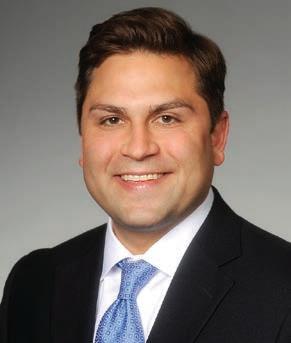
21 minute read
Legislative Leadership
The 91st General Assembly Legislative Leadership
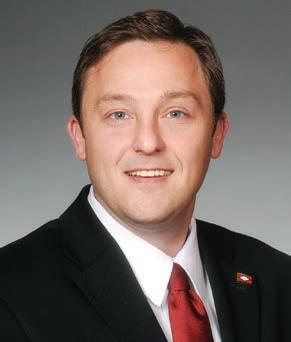
Sen. Jonathan Dismang Senate Pro Tempore
Members of the Arkansas Senate will convene on Jan. 9 to tackle many important issues. In some ways, it feels as though we never left. The fiscal session along with two special sessions in the spring of this year has left our members with little time away from the Capitol before heading into a busy regular session. The 91st General Assembly will have no short order to fulfill. Along with approving a balanced budget and steering through the challenging course of a regular session, legislators will be asked to address issues that are new to our State. On Nov. 8, Arkansans voted to strengthen the GOP’s hold on both chambers and approved four new constitutional amendments, which included the legalization of medical marijuana.
When Donald Trump is sworn in as the 45th President, and the GOP returns with majorities in both the House and Senate in D.C., our members will be closely following policy issues and preparing for a state specific response. Arkansas’ version of Medicaid expansion or Arkansas Works may or may not closely resemble what Washington approves to replace the Affordable Care Act. If it does not, Arkansas will need time to find their course of action. It has been no secret that Arkansas Republicans have remained divided on the best way to respond to President Obama’s Affordable Care Act. Members are hopeful that the policy of the new administration will help settle political differences at the state level.
The creation of enabling legislation for medical marijuana will likely dominate an already complex regular session. The language in voter approved Issue 6 is concise in some areas, but leaves much to be determined in others. Additionally, it gives the legislature and state agencies little time to create the framework for a new industry. The amendment created the Medical
Rep. Jeremy Gillam Speaker of the House
The Arkansas House collectively now has more experience in state government than it has in two decades. We have 17 members, including myself, who will be serving their fourth term for the 91st General Assembly. There are also 29 members who will be serving their third term.
From my own experience, I know I become a better lawmaker bringing with me lessons I learned in the term before. I fully expect that Arkansans will see the experience this body brings forward will result in legislation with long-term solutions.
Our budget sets the tone for everything. Your budget at home reflects your priorities. The budget on the state level is no different.
We continue to direct nearly half of every dollar into education. I don’t see the legislature deviating from that. But just how much we have to work with depends a great deal on what takes place in Washington next year.
If Congress alters the Affordable Care Act, the impact on our state will be significant. Although it may be a positive change in the long run, it will require us to adjust spending immediately.
We now have about 300,000 Arkansans enrolled in the Private Option (Arkansas Works begins January 1). We have debated the funding of this program for four consecutive sessions. It is time to look beyond one year of funding and get to the heart of why 1 in 4 adults in our state makes so little to even qualify.
An integral part of the solution lies in tax reform. Tax reform is not necessarily tax cuts. Real reform spurs the entire economy.
The non-partisan research group The Tax Foundation has released a report detailing ways Arkansas can move from No. 38 to No. 15 in our business tax climate. One proposal includes rolling back tax credits for corporations and using new revenue to reduce corporate income rates. Every business would benefit, and this would get the state out of the business of picking winners and losers. We do a
Legislative Leadership

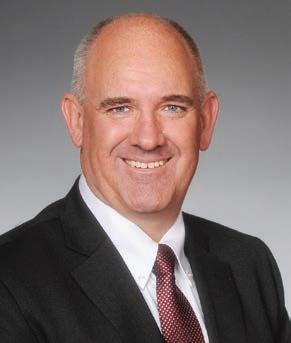
Sen. Jim Hendren Senate Majority Leader
In the past few years Arkansas voters gradually changed the political direction of our state by electing new Republican majorities throughout state government.
The shift in our state’s political culture has set the stage for bold legislative action during the 91st General Assembly. The legislature will build on the gains of the past several years and in 2017 Arkansas will see rapid progress in the creation of a new business environment.
Two years ago legislators approved more than $100 million in income tax reductions for middle class families, as well as $12 million in reductions in capital gains taxes. The usual skeptics wrung their hands and predicted that the tax cuts would cripple government. They were wrong, however. The state’s economy continues to grow at a steady and healthy pace, while government continues to collect sufficient revenue to pay for essential services.
Further income tax cuts will be on the table when legislators convene for the 2017 session. No doubt the professional skeptics will raise their usual complaints about the need to feed a growing government, but we now have two years of data that shows the beneficial effects of tax cuts on the state economy.
When it comes to stimulating a business environment that creates jobs, tax relief is only part of the equation. The 91st General Assembly will consider measures to relieve the regulatory burden on small businesses and start-ups. It may sound like a cliché, but it is past time that we brought common sense back to the Arkansas workplace. That starts with health insurance.
There will be numerous efforts to amend Arkansas Works, the state’s response to the federal Affordable Health Care Act. With the new majorities in both chambers of the legislature, we can be assured those changes will restrict, rather than extend, government’s reach into private markets.
Any changes to Arkansas Works should include greater incen-
Rep. Matthew Pitsch House Majority Leader
As we move into 2017 and the upcoming legislative session, the great state of Arkansas continues to see amazing results under the dedicated leadership of Governor Asa Hutchinson. Without mentioning every initiative Arkansas has focused on, several efforts have served to change the direction of our state; a $100 million tax cut promised and delivered to the citizens, innovative methods in education both in workforce training and high school coding curriculum (making us a leader among states), and finally an ongoing effort at keeping unemployment at the lowest possible level.
With a background as an engineer, I feel we should be measured by the results realized by the people of Arkansas.
• The state’s unemployment rate (3.9 percent) is at an all-time low. Collectively, Arkansas has added 30,000 jobs since Governor Hutchinson took office just two short years ago.
• Media outlets across the country have recognized Arkansas for its coding initiative being implemented in high schools.
Amazingly, there are 1,700 computing jobs in Arkansas unfilled and less than 300 Arkansans graduate with degrees in computer science each year. We hope students take advantage of the new opportunities before them.
• Most exciting, the Arkansas Economic Development Commission has announced new companies arriving and existing company’s job expansions. A key effort has been Governor
Hutchinson’s focus on strengthening relationships across the globe and putting Arkansas squarely in the center of discussions with key economic development decision makers.
DISMANG, continued from Page 30
Marijuana Commission which will meet to create guidelines to regulate production of the plant, sale and access to those with qualifying conditions. Substantial state revenues created from the sale of marijuana would not be realized immediately, while administrative costs to the state are front loaded. Ultimately, a strategy must be created that ensures public safety, while respecting the will of the majority vote.
The governor presented his balanced budget recommendations to the legislature in early November. One hundred million dollars in income tax reductions for the middle class was approved in 2015 and phased into fiscal year 2017. He has asked the legislature to consider another $50 million over the next biennium. The state’s economy has made steady strides under Gov. Hutchinson’s leadership, and unemployment is at record lows. We will continue to move the needle in favor of tax cuts and tools used for economic development while keeping a watchful eye on revenues to support vital services. When Cindy Gillespie was hired as the new director of the Department of Human Services, one of the many tasks she was given was to fix a foster care system in crisis. Putting that organization on the right path will be neither easy nor will it come without significant costs to the state. Effective and efficient processes will be key in creating long-term savings.
The Senate Education Committee recently completed its adequacy report, which creates the formula for which K-12 public schools are funded over the next two years. Additionally, legislators will be given the chance to look at funding for our public universities and colleges. Governor Hutchinson has requested a formula that will reward outcomes rather than enrollment, and proposed an additional $10 million in FY2019. The details of that plan and how they affect individual institutions are yet to be determined.
Overall, the outlook of the 91st General Assembly is cautiously optimistic. Making predictions on outcomes is somewhat like picking college football games. It always seems difficult to determine what will happen until the game begins.
GILLAM, continued from Page 30
disservice to Arkansans focusing on just tax cuts that benefit a segment of our population. Let’s find the courage to research and pass reform.
Another important element to our economy is broadband. Not long ago we were all making decisions on where to live based on school districts, upkeep of the neighborhood or the commute to work. Now people are making decisions on where to live based on the availability of broadband.
The unfortunate part for our state is that nearly 60 percent of Arkansans do not have access to high-speed broadband. We have had a group of legislators studying the best way to provide this necessity. You will see legislation introduced as a result.
I’m looking forward to more interaction with our county and city leaders this year, as I will be serving on the committee for City, County, and Local Affairs.
This session, I will also be serving on the Judiciary Committee. I expect we will hear vigorous debate on judicial appointments and tort reform. Recommendations from the Criminal Justice Reform Task Force will also be brought to our committee. This will be an area where we will rely heavily on input from our county sheriffs and judges.
When it comes to education, Arkansas will be hearing a great deal of discussion on the benefits of professional learning communities.
Professional learning communities within a school asks four essential questions. What do we want students to know? How will we know when they know it? What do we do when they don’t know it? And what do we do when they do know it?
These simple questions are designed to build a collaborative culture for each school.
I’m very humbled that the Arkansas General Assembly elected me to serve in select company. Only four other individuals before me have had the opportunity to serve two terms as Speaker of the Arkansas House. I take this honor very seriously. I will take the lessons I’ve learned from mistakes and those from successes to ensure this opportunity is not squandered.
Senate
Republicans: 26 Democrats: 9
By the numbers
House
Republicans: 75 Democrats: 25
HENDREN, continued from Page 31
tives for private businesses to provide health coverage for their employees. An effective strategy for containing the spread of government-funded health programs is to allow the private sector to compete fairly in the health insurance market place. Voters have sent a clear message: they believe that the private sector can do the job better. That message will be reflected in legislation approved by the 91st General Assembly.
Education policy is another piece of the foundation of a prosperous business environment. In Arkansas this means breaking the grip of the tired old education establishment that has shown so much reluctance to change. Again, voters clearly expressed their desire for change. Legislators will reflect that desire for change by repealing restrictions that hinder the growth of charter schools and by making school choice for parents a practical option.
Change will come to institutions of higher education, whose funding will be based not so much on enrollment but on results. If colleges and universities want to maintain their funding levels, they will have to provide graduates with degrees and certificates that translate into jobs. Our duty as legislators is to create an economic environment that fosters job growth here in Arkansas, so that those graduates have a reason to stay home and use their degrees here in the state.
Voters approved Issue 3 to expand the state’s authority to issue bonds for economic “superprojects.” It is now up to legislators to create a business environment that attracts industry to Arkansas, so that we can employ the advantages that Issue Three affords us.
For decades Arkansas government was controlled by political interests who resisted innovation and who dug in their heels against change, because change threatened their positions of privilege. Now, state government is controlled by people who had to work to get where they are, and who because of their struggles to succeed are not afraid of change. Arkansas has changed course and is embracing innovation. It promises to be an exciting and rewarding legislative session.
PITSCH, continued from Page 31
The 91st General Assembly will face some very difficult decisions, as legislators consider tough issues in which they try to continue to “do the right thing.” Issues I anticipate being dealt with in January’s session include education, healthcare, tax rates/cuts, and a permanent solution to highway funding. On education alone in Arkansas, roughly half of every dollar generated in the state goes to K-12 education. Currently we provide $6,646 per student. For every $2 more per student, the total state budget increases by $1 million. There is currently a debate ongoing concerning the amount that needs to be increased for special education and you will likely hear more about efforts to increase funding to pre-K in the next session as well.
The governor has also indicated he would like to see $50 million more in income tax deductions. As a legislator, we need to be sensitive to recent revenue reports that show a decline in revenue from what previous estimates have predicted. We will continue to watch that data closely and act accordingly. One should also note that this list does not include other items for review, such as Second Amendment (gun rights), Seventh Amendment (tort reform), and various other social issues that will in all likelihood be brought before the assembly for consideration.
Legislative leadership has been working diligently over the past several months to build a framework to ensure we operate on the taxpayer dollar efficiently. It is important to us that no matter what issues come before the 91st General Assembly, we will be civil and make Arkansans proud. Helping to cultivate and energize ideas and policies throughout the state is crucial to moving forward. We must seize every opportunity to advocate for and support a state government who creates an environment for positive job growth, who controls spending, and who strives to make government more effective at every level.
By the numbers
Senators
The 91st General Assembly Legislative Leadership
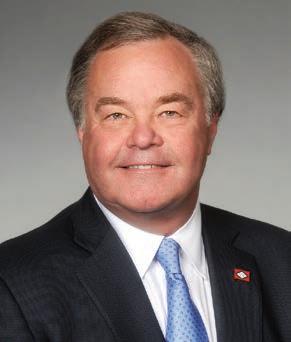
Sen. Keith Ingram Senate Minority Leader
Arkansas has already transitioned from an old South economy that relied almost totally on agriculture to a new South economy that includes manufacturing and services.
Now, Arkansas is moving into what I call the “next South,” where emerging technologies are developed and where political boundaries no longer define the limits of our potential.
This trend is exemplified by encouraging changes in the attitudes of my legislative colleagues since I took the oath of office in 2009. For example, we no longer approach education policy from old perspectives, which could be summarized as writing rules to prevent schools from failing.
Now, Arkansas is among national leaders in teaching computer coding. By next year all of our classrooms will have access to high speed Internet with capability to transport data that is well above national standards.
You can spot the new trends at almost any awards ceremony, where students are recognized for building robots or writing computer programs, working together in classrooms without walls under the tutelage of mentors who not only teach but also work in the research lab of a local industry. Those kids often live in rural communities and they talk knowledgeably about events taking place all over the world.
It’s encouraging that Arkansas legislators genuinely appreciate the fact that education is an economic development issue. They understand that if you want to create jobs you have to improve educational opportunities, from pre-K to graduate research programs.
The direct connection between education and jobs is nowhere more evident than in our two-year colleges, adult education and workforce training programs. In 2015 the legislature enacted a package of bills that dramatically overhauled our workforce training system. Community business leaders, who know which job skills are most in demand, have a vote in what is being taught in vo-tech and technical training classes. Colleges and schools compete for funding through a grant process. The theory is simple: programs that place people in jobs get funded.
More than 16,000 Arkansans earn a degree or short-term training certificate from our two-year colleges every year, which means that over the course of their careers they will earn $400,000 more than people with high school diplomas.
I’m working to instill this new attitude toward transportation. It’s time for a renewed commitment to stable, long-term funding of highways, bridges, ports and intermodal facilities. We’ve been relying on borrowing and bond issues, resulting in a piecemeal approach to highway construction.
Thanks to communications technology and new attitudes, Arkansas schools and businesses view Europe, Asia and South America as their new “neighbors.” It’s time to follow suit on transportation issues. Our outlook must extend beyond the state line; we’re connected to the rest of the world and we can ship our products anywhere by truck, train, barge or tanker.
When it comes to commerce, Arkansas is not only near the geographic center of the United States. We’re at the center of the world.
I’m starting to see a new attitude of responsibility and leadership among elected officials at the municipal, county and state level. A good example is the issue of tax cuts. More of my colleagues are realizing that massive income tax cuts have an impact on education, law enforcement and vital services.
They’re beginning to realize the threat to stability that is created when sales taxes are the foundation of the budget. If there is an economic downturn, and there will be, the effect on state revenue is exaggerated. Until the economy rights itself, budgeting can be extremely volatile.
Legislative Leadership
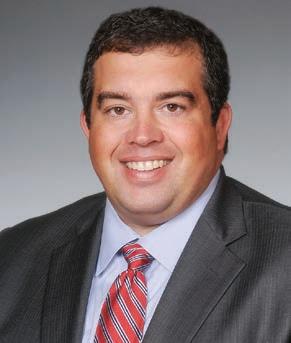
Rep. Michael John Gray House Minority Leader
As we approach the start of the 91st General Assembly there is no shortage of topics up for discussion. Whether it be medical marijuana, education or tax cuts that lead the conversation; an issue’s impact on the budget will play a significant role. The governor has indicated that there is room in the budget for tax cuts, so the question becomes how to balance these cuts with other impending priorities. While there will be many issues competing for priority, education, broadband access and highway funding will be among those most discussed.
Education
It is impossible to want the best for our next generation without ensuring that all children have the opportunity to receive a quality education. It is critical these educational opportunities start early to ensure we offer a strong start to even our youngest learners. The perfect way to do this is to make sure pre-K is available to every child.
Study after study has demonstrated a link between pre-K and improved social, emotional and academic outcomes for students. Children who have access to quality, affordable pre-K programs have a better chance of graduating from high school and going on to attend college. In addition, pre-K allows parents to return to the workforce with the knowledge that their children are in a nurturing and learning-rich environment. Certainly, pre-K is a better investment than spending exponentially more dollars on juvenile or adult incarceration. Across Arkansas, local chambers of commerce have become so convinced of the positive link between pre-K and workforce development that many have adopted pre-K as one of their top priorities. Even economic impact studies show that for every dollar we invest in pre-K, we get $7 in return.
Emphasis on Infrastructure
Safety of the roads and bridges throughout the state is not a headline topic until it’s time to find the money to pay for the upkeep. As counties in every part of the state deal with budget constraints, legislators will be faced with finding solutions to highway funding that do not create even more burdens at the city and county levels. While much of the conversation is usually about new construction, there are many people who would just like to see safer shoulders and rural highways that do not look like patchwork quilts. Longterm solutions that focus not only on new construction, but also on needed maintenance and dedicated ways to pay for it must be a focus.
Increased Access to Internet Service
Just as access to electricity and water is vital to our lives and the lives of our children, the ability to use the Internet is rapidly joining them as a must-have. It is no longer a luxury like cable television. Our schools are utilizing technology to improve the opportunities for our children, but when school is out, access to the Internet is over for many of them. Just as the leaders in the 1940s convinced the government that electricity to rural Arkansas was a matter of life and death, today we must remind them that affordable access to the quality Internet service must have the same importance or our children will not be able to compete and our communities will not survive.
The 91st will be all about priorities, with our No. 1 priority being reasonable and responsible legislators who are working to make life in Arkansas better for everyone. These issues may not necessarily be the ones that get the most discussion at the coffee shop, but hopefully they’ll make a difference at your kitchen table.
INGRAM, continued from Page 34
A fair tax system that is balanced on sales, income and property taxes will provide the long-term stability that business leaders value when making decisions about whether to locate or expand in Arkansas.
Government has a role in securing our prosperity, from educating our young people to protecting our most vulnerable, and from maintaining infrastructure to promoting the latest scientific research.
In order for our elected leaders to properly balance the competing interests of all the various sectors of our economy, it’s essential that our political system be transparent and fair. That means the legislature needs to respond to several emerging trends that threaten to distort the political process, such as the alarming growth in the amount of “dark money” contributions to candidates for office and to the judiciary.
Unless we bring our campaign finance laws up to date, we run the risk of losing control of our electoral and legislative processes to a privileged few special interests who go to great lengths to hide their identities. If they choose to influence the process, as is their right, it is reasonable to require them to do so publicly.
All in all, the future of Arkansas is encouraging. Thirty years ago we began making a series of investments in public education and we’re seeing the benefits. What’s exciting is that many more benefits are right around the corner.
2017 Regular Session Important Dates and Deadlines
Jan. 9, 2017 — Regular session convenes at noon Jan. 23, 2017 — Deadline to file retirement legislation and certain health care legislation Feb. 8, 2017 — Deadline to file constitutional amendments Feb. 27, 2017 — Deadline to file appropriation bills March 6, 2017 — Final deadline to file any legislation
Monday
• Joint Public Retirement & Social
Security Programs
“B” Committees
• House State Agencies & Governmental Affairs
Committee Schedules
Wednesday, Friday
Labor • Senate Revenue & Taxation • Senate Education • Senate Judiciary
“B” Committees • House Aging, Children and Youth,
Legislative and Military Affairs • House Agriculture, Forestry &
Affairs • House Insurance and Commerce • House State Agencies & Governmental Affairs
“A” Committees
• House Education • House Judiciary • House Public Health, Welfare &
Labor • House Public Transportation • House Revenue & Taxation
Economic Development • Senate Insurance & Commerce • Senate City, County & Local • Senate State Agencies & Governmental Affairs • Joint Budget Committee



